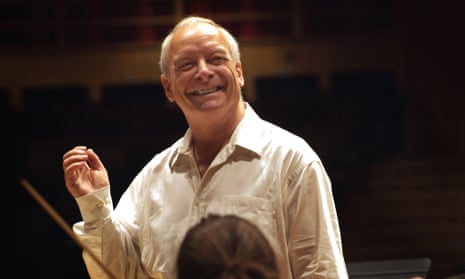Christopher Hogwood, conductor, musicologist, keyboard player and founder of the Academy of Ancient Music, has died aged 73. Once described as “the von Karajan of early music”, Hogwood was one of the most influential exponents of the early-music movement.
He founded the Academy of Ancient Music in 1973, rapidly establishing a place for it at the forefront of the period-instrument movement. Over the following 30 years, he directed the AAM on six continents and made over 200 CDs, including the first ever complete cycle of Mozart symphonies on period instruments, as well as many other first recordings of baroque and classical masterworks by a period orchestra. His iconic recordings include a 1980 version of Handel’s Messiah with Emma Kirkby that was named by BBC Music Magazine as one of the top 50 recordings of all time.
Other previous roles include being a founder member of the Early Music Consort, keyboard player and soloist with the Academy of St Martin in the Fields, artistic director of the King’s Lynn Festival, artistic director of the Handel and Haydn Society in Boston, a tutor at Harvard University, principal guest conductor of the Kammerorchester Basel and professorships at both Cambridge and Cornell Universities.
He was also passionate about music of the 19th and 20th centuries, with a particular focus on the early Romantics and the neoclassical school, where he applied the same rigour and supreme musicianship to all his work, striving to discover and to recreate the composer’s intentions both in notation and performance.
Christopher Purvis, honorary president of the AAM, said: “Christopher had extraordinary generosity of spirit. He was a great ambassador for historically informed music, the movement of which he was a founder.”
“He made music and made friends with equal, infectious enthusiasm. He changed our lives,” added the AAM’s chairman, Terence Sinclair.
The Academy’s current music director Richard Egarr said: “I am deeply saddened by the news. Christopher provided a fantastic legacy for me to build upon when I joined in 2006, and he will be greatly missed by all who knew and worked with him.”
Soprano Danielle de Niese, who made her Royal Opera House debut in 2009 with Hogwood, said: “It was an absolute honour to [perform] under the care and guidance of Christopher Hogwood. I was very much in awe of his reputation and he not only lived up to it, but was a wonderfully jovial person too. It was easy to see that he loved being in the process as much as the performances. He will be truly missed by all of us, and his legacy is assured.”
“Christopher Hogwood was one of the true pioneers of early music performance. It is not an exaggeration to say that he changed our musical taste, and changed the sound of baroque and classical music for ever,” said Nicholas Kenyon, managing director of the Barbican and former director of the Proms and controller of Radio 3.
“The Academy of Ancient Music was one of the first period-instrument orchestras in this country, and became the most successful. Players were taking great risks to revive forgotten instruments and playing techniques, but it created a wave of public enthusiasm... He was a superb broadcaster, charming, incredibly knowledgeable, dedicated and supportive to such a wide range of musicians. In a period that has seen the death of two continental pioneers, Gustav Leonhardt and Frans Bruggen, this feels like the end of an era.”
Conductor John Eliot Gardiner paid tribute to his fellow period performance pioneer: “Those twin pioneers of historically-informed performance practice, David Munrow and Christopher Hogwood, were exact contemporaries of mine at Cambridge. They were a formidable duo... Hogwood cut an unmistakeable figure with his trademark beard and sandals and seated at his harpsichord. He was a tenacious advocate of period style and scholarship and will be sorely missed in the world of Baroque and Classical music.”

Comments (…)
Sign in or create your Guardian account to join the discussion